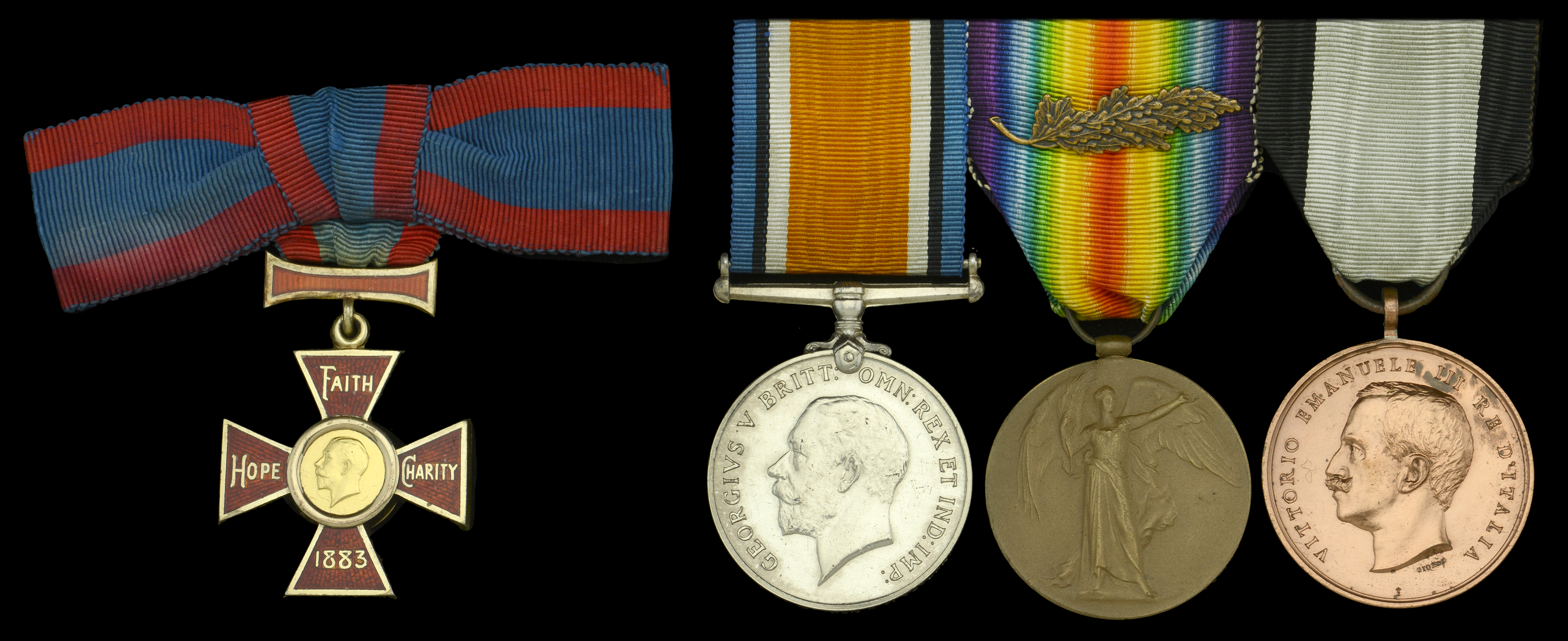An extremely fine Great War R.R.C. and Second Award Bar group of four awarded to Principal Matron Dorothea M. Taylor, Queen Alexandra’s Imperial Military Nursing Service, who was further recognised by His Majesty the King of Italy for her valuable work with the Italian Expeditionary Force Royal Red Cross, 1st Class (R.R.C.), G.V.R., with Second Award Bar, silver-gilt, gold, and enamel, the reverse privately engraved ‘D. M. Taylor Jan 1916 Q.A.I.M.N.S.’, on lady’s bow riband; British War and Victory Medals, with copy M.I.D. oak leaves (A. Pr. Matron D. M. Taylor.); Italy, Kingdom, Bronze Medal della Salute Publica, unnamed as issued, nearly extremely fine (4) £2,000-£2,400 --- R.R.C. London Gazette 14 January 1916. R.R.C. Second Award Bar London Gazette 1 January 1921. Italy, Medal of Merit for Public Safety London Gazette 2 November 1920. Dorothea Matilda Taylor was born in Edinburgh on 29 November 1873, the daughter of physician William Taylor. Educated at St. George’s High School in Edinburgh, she crossed the Firth of Forth and River Tay to take her nursing training at Dundee Royal Infirmary from May 1900 to May 1903. Appointed Staff Nurse to the Q.A.I.M.N.S. on 10 July 1903, she was raised Sister on 18 November 1904 and sent to Egypt from April 1906 to October 1910. Sent to Khartoum on a tour of duty in 1907, she likely treated people suffering from malaria, yellow fever, and other infections associated with a lack of safe water. Returned to the United Kingdom, Taylor was promoted Acting Matron on 8 August 1914 and placed on home service. Awarded the Royal Red Cross, she received her decoration from the hand of the King at an investiture held in Buckingham Palace on 15 January 1916. Posted overseas to Italy on 8 December 1917, she later wrote a most emotive account of her experiences: ‘On a cold, bleak morning, early in December 1917, I and my party arrived at the Italian Frontier on our way to join the Italian Expeditionary Force. The ground was white with snow, and it was exceedingly cold. The railway station was guarded by Italian soldiers, and even at the door of the refreshment room there was a sentry with a fixed bayonet. We were informed by the Railway Transport Officer that food was very short in Italy, and that he did not know where we were to go, but he would send us on to Turin, where we arrived about 5 p.m. - No one seemed to know anything about us at Turin, so we were again sent on - this time to Genoa - and arrived there about midnight. Again, we were not expected, so we were taken to No. 11 General Hospital to be kindly received and housed until quarters could be found for us.’ Sent to a small hospital in Arquata and then on to Stationary Hospitals at Cremona and Bordighera, Taylor spent New Year’s Day of 1918 at Padova in a ‘dreary and cold hotel’, the night being spent in a cellar as the town received the attention of the enemy. Transferred to work at a Casualty Clearing Station in the foothills of the Austrian Alps, she took solace in the beauty of the landscape and hospitality of the Italian people, before being sent on to a hospital in Taranto and digs in newly constructed Nissen huts. It was at around this time that Taylor’s health began to suffer, likely in consequence of the volume of work and bombing by the armies and air forces of the Central Powers; the recipient’s Service Record notes her struggling with concussion, neuritis and headaches. Sent back to England at the cessation of hostilities, Taylor received the Second Award Bar to her Royal Red Cross at an investiture held at Buckingham Palace on 8 March 1921. Her hard work from 1917 to 1918 was further recognised by the King of Italy, Taylor receiving the rare award of the Bronze Medal della Salute Publica - usually conferred for service to Italian citizens in staving off disease and protecting societal health. Raised Matron on 31 January 1921, Taylor took further appointment at the Officer’s Hospital in Scarborough and the Military Hospital in Cosham, but with her health failing she was invalided on 15 December 1924 and placed on retired pay. She died of pneumonia on 11 October 1928, her last address noted as Swanston Cottage, Oulton Broad, Lowestoft. Sold with the recipient’s original silver Q.A.I.M.N.S. cape badge, hallmarked Birmingham 1915.


